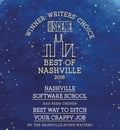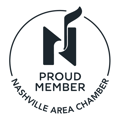In the latest episode of Stories from the Hackery, Nashville Software School (NSS) alum Shalane Proctor of part-time Web Development Cohort E19 and NSS instructor Dr. Teresa Vasquez (Dr. T) sat down with John Wark to talk about career change, neurodivergence, and how generative AI is supporting—not replacing—software developers. Their conversation was honest, insightful, and full of practical takeaways for anyone navigating the world of tech, but especially those who are neurodivergent.
Finding Her Path, One Step at a Time
Shalane spent nearly ten years in customer service before reaching a breaking point. "I was getting really, really burnt out," she said. Her sister, a principal software engineer, encouraged her to consider coding. That nudge, combined with NSS’s hands-on teaching approach and evening program flexibility, gave her the opening she needed.
Balancing a full-time job while learning to code wasn’t easy, but she found momentum by networking early and applying for jobs before graduation. Three months before finishing the program, she landed her first role as a software developer. When a layoff hit 18 months later due to economic shifts, her network came through again—this time with an opportunity at MyDecisive, where she quickly moved from contractor to full-time team member. "It’s great pay and just generally an incredible vibe," she said, adding that finding the right culture was just as important as the work itself.
Learning While Neurodivergent—and Supporting Others Who Are
During bootcamp, Shalane was diagnosed with ADHD and later AuDHD (autism + ADHD). That discovery helped explain why traditional learning environments had always felt off. With support from her instructors at NSS and her own growing self-awareness, she pushed through challenges and developed a clearer picture of the kind of work environment where she could thrive.
Dr. T, who leads the evening web development program and founded an organization called Repped in Tech, brought her own neurodivergent lens to the discussion. "Change is hard for all people; however, neurodivergent [individuals] struggle a lot more with it," she explained. Her work with Repped In Tech focuses on assistive technologies and creating structures that help neurodiverse learners build both technical and life skills. She leverages this experience in the NSS classroom where she often helps students unpack those moments of fear and doubt: "One of the things that I like to tell neurodivergent people... is to pay attention to what’s going on when that fear hits. That feeling might be telling you that you’re about to soar."
AI as an Assistant, Not a Shortcut
Both Shalane and Dr. T reflected on how generative AI tools, like ChatGPT, have become key parts of their workflows. Shalane first started using it during bootcamp to help her understand back-end concepts in Python and Django. For someone who learns visually and by asking questions, the ability to ask ChatGPT question after question was a big breakthrough.
But she also learned there’s a line. "I can’t be a good engineer and use AI to write my code," she said. "It is a tool, not a substitute for being a dedicated and curious developer." Dr. T echoed that sentiment—and added that AI also helps her as a software development leader and educator, giving her new ways to break down complex ideas or check tone in written communication.
Where AI shines, they agreed, is in helping reduce friction—especially for neurodiverse developers. "AI is really giving us access to things that we have not had access to before," Dr. T said. Whether that’s reframing dense Jira tickets, explaining unfamiliar terms, or helping prepare better questions for a 1:1, these tools can act as a bridge—supporting, not replacing, the human learning process.
Shalane and Dr. T’s experiences remind us that assistive tools, like generative AI, can level the playing field, but they can not take the place of working alongside others. When paired with strong community and thoughtful mentorship, tools like AI can help more people find their way in a tech career. Their stories are a powerful example of what’s possible when technology is used to lift, not shortcut, the work.
🎧 Listen to the full episode on SoundCloud or wherever you listen to podcasts.
Show Notes:
00:00 Introduction to Stories from the Hackery
00:37 Meet the Guests: Shalane Proctor and Dr. Teresa Vasquez
02:34 Shalane's Journey into Software Engineering
07:22 Dr. T's Background and Passion for Neurodiversity
09:06 Navigating an NSS Bootcamp as a Neurodivergent Learner
16:23 Finding the Best Working Environment for You
19:52 Using Generative AI to Understand New Concepts
26:56 You can’t be a good engineer and use AI to write your code.
32:51 Will Generative AI Take All The Software Development Jobs?
42:25 Use Cases for Generative AI in Software Development
48:06 Using Generative AI as a Neurodivergent Developer
57:13 How Generative AI Has Lowered the Friction in Shalane’s Career Growth
01:02:46 Final Thoughts and Takeaways
Links:
Nashville Software School
Repped in Tech
The 70% Problem - By Addy Osmani







